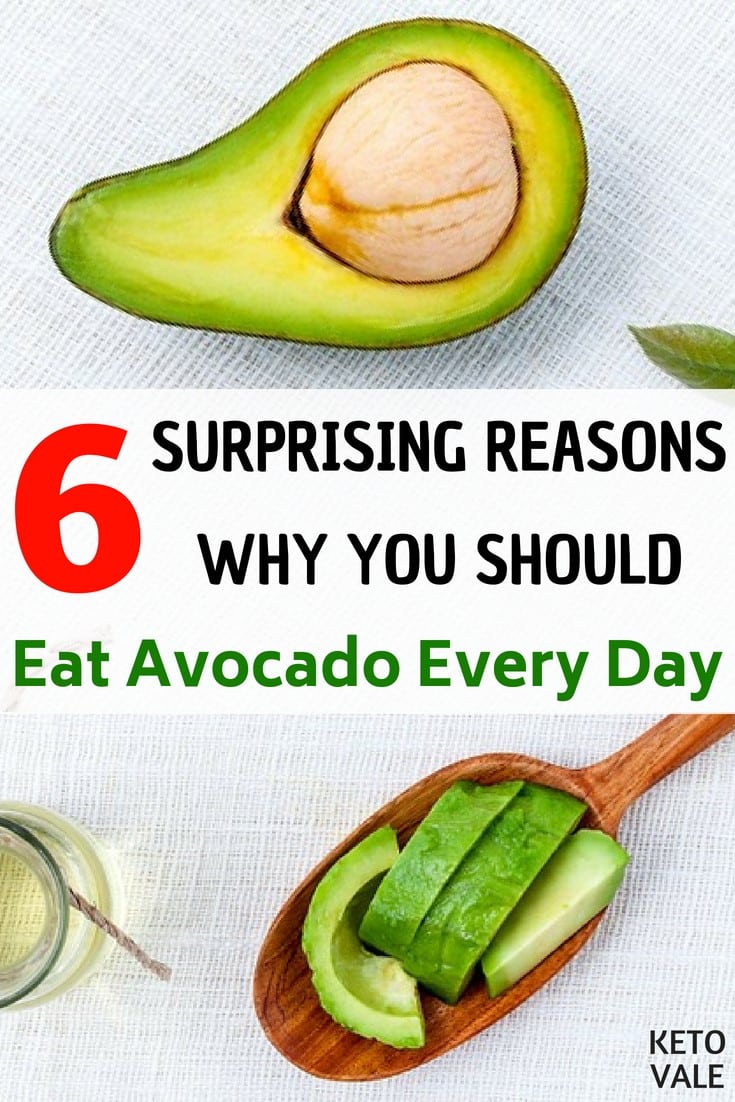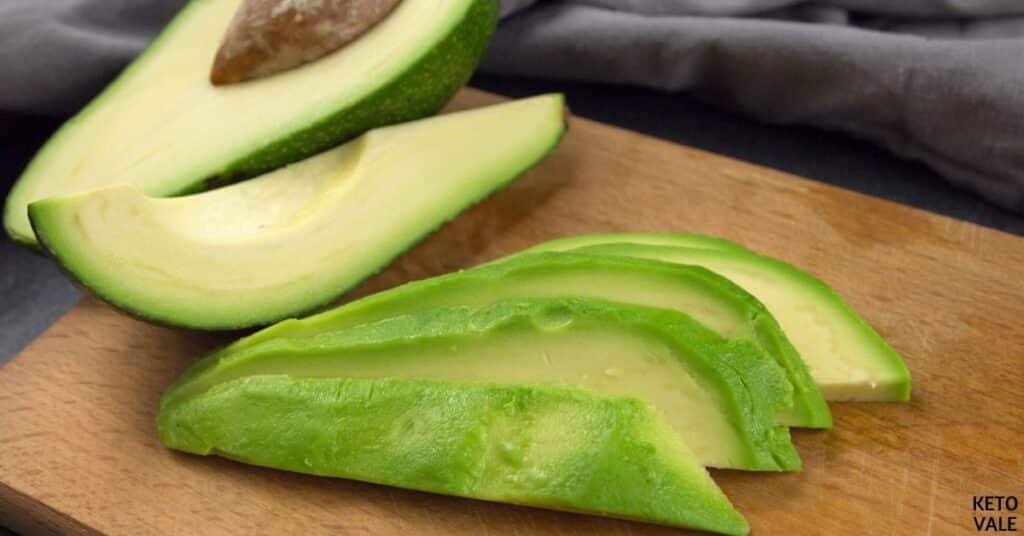For a long time, people stayed away from avocados because of their high fat content. After all, fat makes up 77 percent of its total calories, which makes avocados one of the fattiest foods on the planet.
Thankfully, recent studies have debunked the myth that fat is bad and avocados are now one of the most versatile health foods. It’s also one of the best healthy fats for keto diet.
Although they are often thought of as a vegetable due to their lack of sweet flavor, avocados are actually a fruit. In addition to being loaded with healthy anti-inflammatory fats, avocados contain around 20 vitamins and minerals and a wide range of highly nutritious plant compounds.
They make a great first food for babies and can be added to smoothies, salads, baked goods, and dips and condiments. Here is why it should be on your list of healthy foods.
What Is Avocado Good For?
Not many foods have as many proven health benefits as avocados. They truly fit the description of a superfood because of their superior nutrition and incredible healing powers.
Here are some of the most important reasons why you should include them in your daily diet, especially if you are eating a keto diet.
#1. Boosts Heart Health
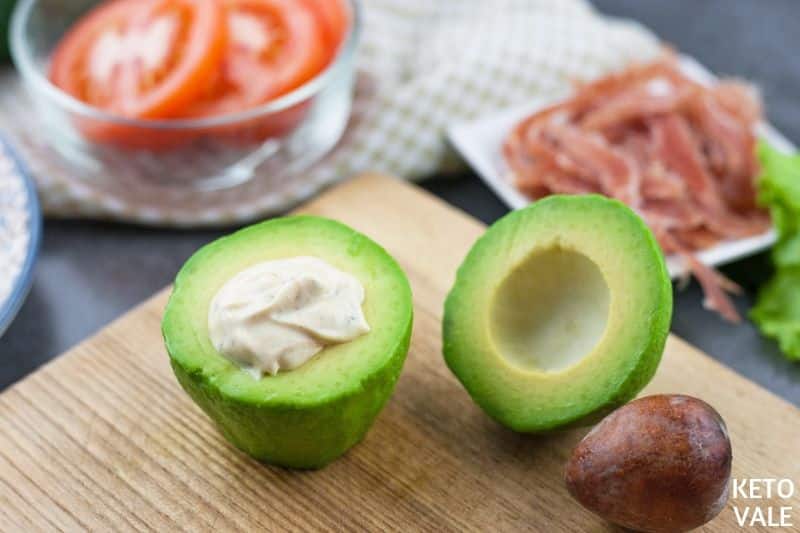
Although the high fat content in avocado was once thought to be bad for the heart, we now know that avocados contain a special kind of fat that improves heart health.
Research shows that diets high in monounsaturated fat (the type of fat found in avocados) and low in sugar have been shown to prevent atherosclerosis, which is a condition that causes hardening of the arteries and blocks blood flow to the heart (1).
Avocados contain oleic acid, which is a type of monounsaturated fatty acid that has been linked to cancer prevention. Oleic acid is great at holding its nutritional content when heated to high temperatures, which makes avocado oil the perfect oil to cook with (2).
In addition to monounsaturated fatty acids, avocados contain other plant compounds that help reduce blood pressure and cholesterol such as beta-sitosterol compounds, potassium, magnesium, and lots of fiber.
One study showed that people with normal blood lipid levels who ate avocados dropped their total cholesterol levels by 16 percent. Those with high cholesterol that ate avocados dropped their cholesterol levels by 17 percent, including a 22 percent reduction in LDL or “bad” cholesterol and an increase in HDL or “good” cholesterol by 11 percent (3).
#2. Reduces Risk of Metabolic Syndrome
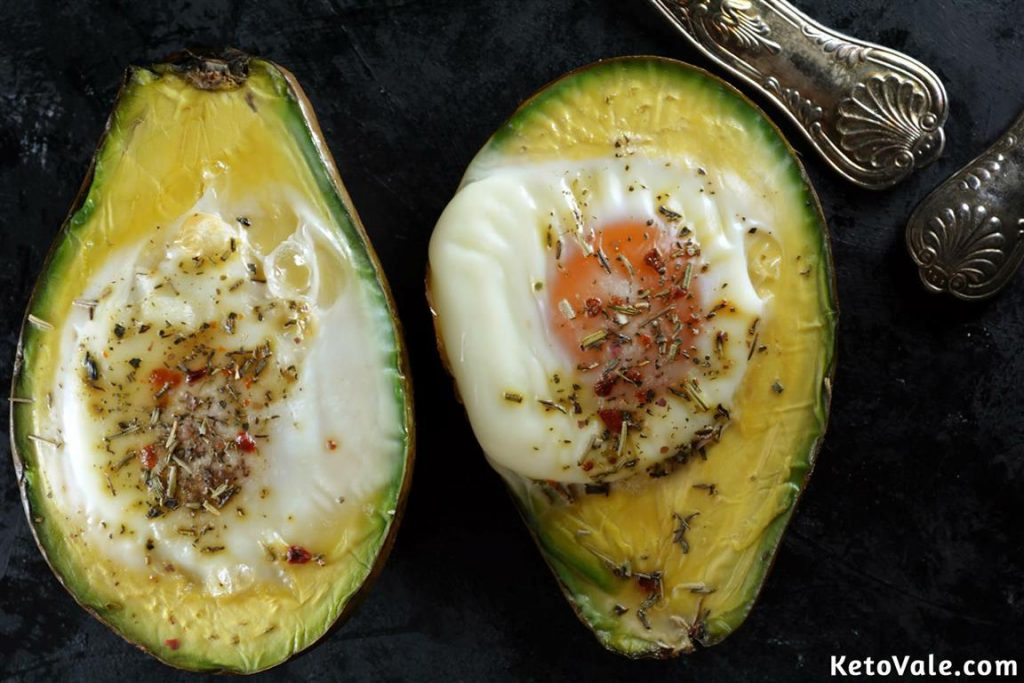
Metabolic syndrome is a term used to describe a group of diseases such as diabetes, obesity, stroke and heart disease.
According to a 2013 study, avocados regulate hormones that are responsible for mediating metabolic syndrome. The study found that people who eat avocados tend to be healthier in general (4).
According to the study, people who eat avocados on a regular basis had healthier diets than those who did not, including higher intakes of fruits and vegetables, good fats, dietary fiber, and lower sugar intakes.
People who eat avocados also had lower body weight, trimmer waist lines, and lower cholesterol levels. In conclusion, the study indicated that people who eat avocados are 50 percent less likely to develop metabolic syndrome.
#3. Healthier Physical Appearance

Many beauty trends are centered around using avocados and avocado oil topically on the skin and hair. Eating them is a great way to improve your physical appearance from the inside out. They are high in fat-soluble vitamins and healthy fats that moisturizes the skin and gives it an attractive glow.
Avocados are also high in antioxidants. They fight free radical damage that speeds up the aging process and causes you to look older, such as wrinkles and sunspots. Specifically, avocados contain a carotene antioxidant commonly found in carrots and squash known as lutein.
Although it is associated with eye health, lutein also promotes youthful and healthy looking skin and hair. Research shows that the good fats in avocados helps you absorb lutein better, so aim for some at every meal (5).
#4. Fights Off Cancer
Nothing is scarier than an aggressive form of cancer. Several studies have shown that avocado contains plant chemicals so powerful that they can prevent cancer. According to a 2009 study, people with oral cancer were able to bypass chemotherapy and treat their disease with avocados instead (6).
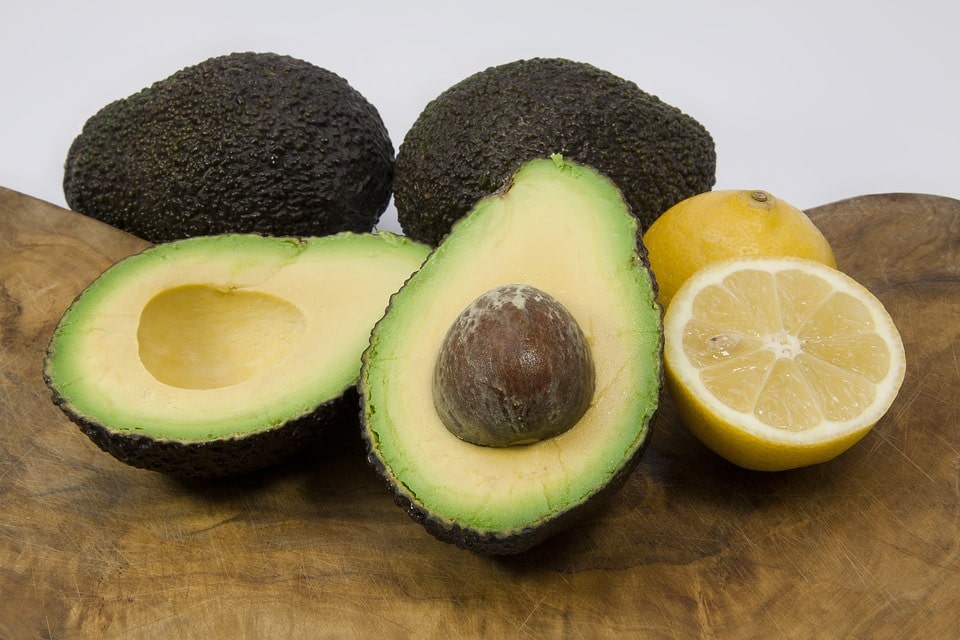
Related: Benefits of Drinking Lemon Water
According to researchers at Ohio State University, avocados contain certain plant chemicals that inhibit the growth of cancerous cell cycles. They also cause cancer cells that are already formed to die off (7).
The monounsaturated fats in avocados have been shown to fight off cancer. Because of their natural anti-inflammatory properties, monounsaturated fats are better than other types of fats for fending off offenders and pathogens that cause disease.
Lastly, avocados contain a high amount of antioxidants that fight free radical toxins before they can accumulate in your tissues and form tumors. Avocadoes contain two primary antioxidants known as beta-sitosterol and carotenoids that have been shown to prevent prostate and skin cancer, respectively (8).
#5. Weight Loss

How can a food that’s high in fat help you lose weight? Diets that are lower in carbohydrates and higher in fat and protein are the best for losing weight.
Avocadoes fit right into that category. They are high in good fats and fiber to keep you fuller for longer periods of time, and low in carbohydrates that won’t be stored as fat in your body.
Research supports eating a diet high in monounsaturated fats to assist with weight loss more so than eating lots of carbohydrates and low amounts of fat (9).
Have you ever noticed that you feel hungry after eating a meal that’s high in carbohydrates and low in protein and fat?
Low fat meals spike blood sugar levels. When your glucose crashes, your body signals you to eat again because it needs to restore those levels. But when you eat foods that are low in sugar and high in filling fiber and fat, you become sustained for longer periods of time and require less calories.
A 2005 study found that eating 30 grams of fat from avocados each day didn’t comprise weight loss when substituted for 30 grams a day of a combination of mixed dietary fat from other sources when the subjects were on an energy-restricted diet. Results of the study found that when subjects switched their dietary fat to avocados, they had improvements in their body mass, body fat percentage and body mass index. The avocado group also experienced better fatty acid blood serum levels (10).
#6. High in Fiber
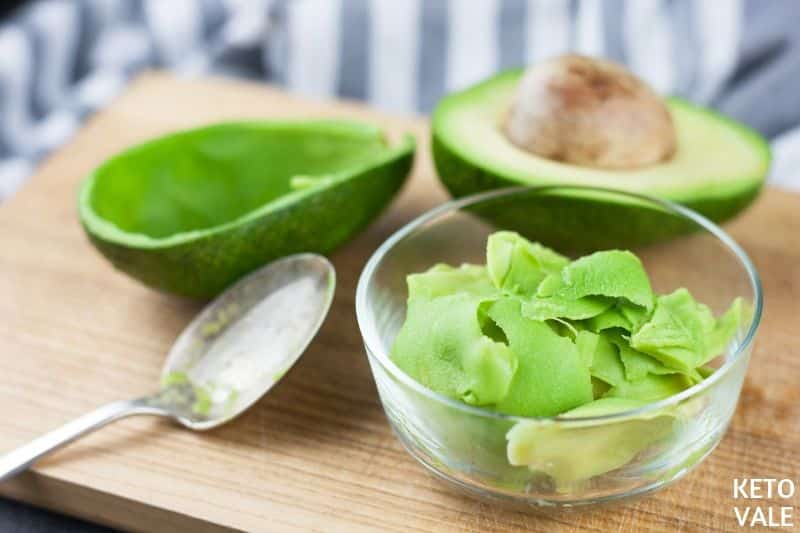
A single avocado provides anywhere from 11 to 17 grams of fiber depending on its size. Fiber is needed for proper digestive health by moving matter through the gastrointestinal system. Eating more fiber has been shown to improve digestive conditions such as irritable bowel disease.
If you’re experiencing constipation on a low carb diet, avocado is one of the great fiber sources that can help.
A Harvard report found that foods that are high in fiber also reduced the risk of heart disease, type two diabetes, colon and breast cancer, and diverticulitis (11).
Fiber plays an important role in diabetes by maintaining proper blood glucose levels. Fiber slows the rate in which glucose is dumped into the blood. When glucose levels are dumped into the blood all at once, it causes an insulin spike. Eventually the glucose will run out, causing a drop in blood sugar levels.
The brain then sends out signals of hunger to the body in attempt to stabilize levels by eating more glucose. Fiber acts as a control device by sending a slow and steady stream of glucose into the blood, which prevents glucose spikes and crashes.
Your brain also relies on fiber to send a steady supply of energy (glucose) to its cells for memory, concentration, and mood. If you’ve ever noticed you get cranky or feel unable to concentrate when you’re hungry or about an hour after eating a sugary meal, it’s because your blood sugar levels are off and your brain’s energy supply is being interrupted.
Because avocado is so high in fiber content, this makes the final net carb very low, which is why it’s the absolute best keto fruit.
Avocado Nutrition Facts
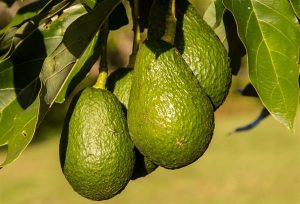
Avocados are a pear shaped fruit with alligator-like skin. The skin needs to be peeled before eating.
If the avocado is not ripe, peeling the skin is very difficult. It also means that the fruit will be too hard and not ripe enough to eat.
To pick out the perfect avocado, look for one that has medium softness. It should be just a bit squishy and not too firm. Avocados ripen quickly, so don’t buy one that’s already brown and too soft as you won’t be able to eat it.
The following nutritional information is for a 100 gram serving size, but most people enjoy avocados by slicing them in half.
You can eat one half early in the day for breakfast or lunch and save the other for dinner. Keep in mind that avocados don’t keep well in the refrigerator after they are exposed to oxygen, so eating one a day is best.
A 100 gram serving of avocado contains the following (12):
- 160 calories
- 14.66 grams of fat
- 2 grams of protein
- 8.53 grams of carbohydrates
- 6.7 grams of fiber
- 1.83 grams of net carbs
Avocado has more potassium than a banana and no cholesterol or sodium. Potassium is needed for brain and blood health. It also reduces the risk of stroke, enhances muscle strength, stimulates metabolism, reduces stress and anxiety, balances electrolytes, and lowering blood sugar levels.
Macros of an Avocado
One medium avocado (approximately 201 grams in weight) has 322 calories, 4 grams of protein, 29.5 grams of fat, 17.1 grams of total carbs, 13.5 grams of fiber or 3.6 grams of net carbs (12).
For a complete guide on how to calculate net carbs, see this net carb explanation.
How Many Net Carbs Are There In Avocado?
A 100-gram serving of avocado has 1.83 grams of net carbs. One medium avocado has 3.6 grams of net carbs.
Can You Eat Avocado on Keto?
Yes, avocados are keto-friendly and many keto dieters consume avocados on a regular basis.
How to Eat Avocado
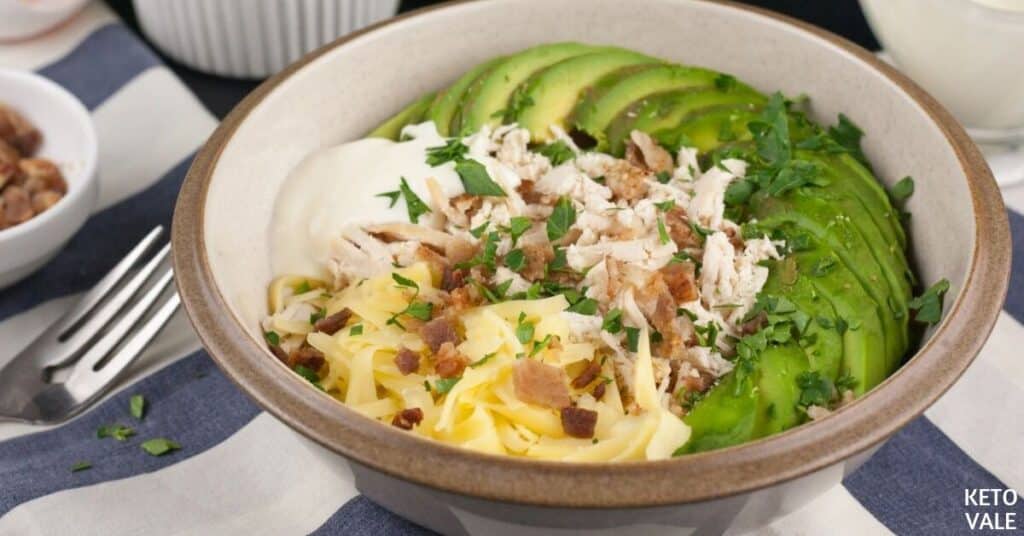
Use these simple tips to add more avocado to your diet:
- Dip veggies sticks in guacamole
- Cook with avocado oil
- Add avocados to salads or lettuce wraps
- Make avocado smoothie: replace bananas with avocados in a smoothie for a thickening agent
- Eat them for breakfast with eggs and bacon
- Eat them when you need a quick keto snack.
- Add avocado into your Keto meal plans to increase the healthy fat intake.
How Much Avocado Can You Eat on Keto?
Avocado is a low-carb and high fat food for keto diet, it is okay to eat one avocado per day as long as you also keep an eye on your daily carb intake. Some people might eat more or less, depending on their daily personal macros, and how much they like eating it.
Keto-friendly Avocado Recipes
Here’s a list of keto dishes you can make with avocado:
- Avocado Spinach Dressing
- Cabbage Fish Taco Bowls with Avocado
- Arugula Avocado Salmon Egg Rolls
- Tuna Avocado Boats
- Chicken Avocado Cucumber Nori Rolls
- Mexican Shrimp Avocado Cauliflower Rice Bowl
- Scrambled Egg Chicken Avocado Breakfast Bowl
- Avocado Bun Burger
- Salmon Egg Avocado Salad
- Keto Avocado Brownies
Did you enjoy reading these health benefits of eating avocados? Make sure to share this article with your friends so they know about this too!
Pin this photo on Pinterest for later reference!
